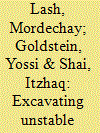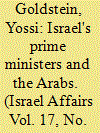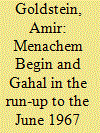| Srl | Item |
| 1 |
ID:
183982


|
|
|
|
|
| Summary/Abstract |
This article examines the factors that influenced the trends in archaeological excavations in Judea and Samaria during the decade attending the 1967 Six-Day War. Examination reveals a close connection between the political trends in Israel as they pertained to Judea and Samaria and the archaeological excavations undertaken in this region. When a prime minister appeared to consider Judea and Samaria an inseparable part of the state of Israel archaeologists followed (Meir). But when prime ministers regarded Judea and Samaria as territory that would be returned to the Jordanians (Eshkol and Rabin), the archaeologists stopped excavating in the region.
|
|
|
|
|
|
|
|
|
|
|
|
|
|
|
|
| 2 |
ID:
177741


|
|
|
|
|
| Summary/Abstract |
In order to pressure Israel to withdraw from the lands it took following the 1956 Suez War, the United States made two key commitments. It promised Israel it would open the Straits of Tiran if Egypt reimposed a blockade and that if the blockade nevertheless persisted, Israel would have the right to act on its own to ensure free passage of Israeli ships. When Nasser closed the Straits in 1967, President Johnson reneged on both commitments. LBJ chose not to act to end the blockade and warned Israel not to act alone. The failure to live up to these commitments contributed to the outbreak of the 1967 War, hampered efforts to get Israel to give up the territories it conquered as a result of the war, and reinforced in Israel the conviction that it could not depend on others for its security. Israel and the Middle East would be very different places today if those commitments had been fulfilled.
|
|
|
|
|
|
|
|
|
|
|
|
|
|
|
|
| 3 |
ID:
110261


|
|
|
|
|
| Publication |
2012.
|
| Summary/Abstract |
On the eve of the Six Day War 1967, a sharp rift developed between Israel's military high command and the Government, especially with Prime Minister Levi Eshkol. The officers demanded a preemptive strike against the Egyptian forces in the Sinai but Eshkol. In two stormy meeting the prime minister and some of his ministers held with IDF's generals on May 28 and June 2, 1967. Many commentators referred to what happened during these meetings as a "Putsh" or revolt, implying that the general's pressure exerted by the general crossed the line and were illegitimate.
This article will examine the back ground and proceeding of these meetings and revaluate the confrontation and it impact on the decision making of the government to go to war on 5 June 1967.
|
|
|
|
|
|
|
|
|
|
|
|
|
|
|
|
| 4 |
ID:
103225


|
|
|
|
|
| Publication |
2011.
|
| Summary/Abstract |
This article identifies similar patterns of behaviour and attitudes towards Arabs and the Arab states among three of Israel's prime ministers in the first 10 years that followed the 1967 war: Levi Eshkol, Golda Meir, and Yitzhak Rabin. All three believed in the right of the Jews to the Land of Israel, in their right to return to their ancient homeland to become a majority, and in the establishment of the state of Israel as the national home of the Jewish people - a state founded on values of democracy and equal of rights for all its citizens. Convinced that the Arabs would never reconcile themselves to Jewish sovereignty in (however small) a part of the Middle East, they believed that Israel must rely on its sword if it were to survive. They differed, nevertheless, over how to achieve these goals. While Eshkol and Rabin believed that Israel should withdraw from most of the territories captured in the 1967 War as a condition for partial (Rabin) or full (Eshkol) peace, Meir did not share this view.
|
|
|
|
|
|
|
|
|
|
|
|
|
|
|
|
| 5 |
ID:
154057


|
|
|
|
|
| Summary/Abstract |
This article discusses the causes and processes that drove Menachem Begin and his Gahal party into the Israeli cabinet during the three-week waiting period preceding the June 1967 war (or Six Day War as it is commonly known). A close examination of Begin’s behaviour reveals a calculated political move aimed at exploiting deep processes within the Israeli political establishment in general, and its right-wing factions in particular. This sheds fresh light on a number of key events preceding the war, notably Prime Minister Levi Eshkol’s surrender of the defence portfolio to Moshe Dayan, as well as on the deeper processes that led within a decade to the Likud’s (Gahal’s successor) rise to power, for the first time in Israel’s history.
|
|
|
|
|
|
|
|
|
|
|
|
|
|
|
|